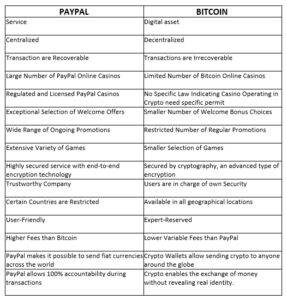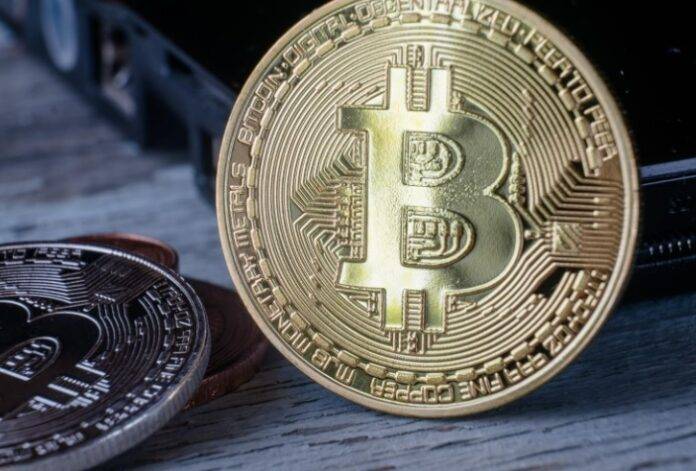In the online casino industry, online casinos accepting PayPal became the most sought-after, with popularity fueled by the UK Gambling Commission’s announcement to ban the use of credit cards to gamble in Great Britain. Currently, Bitcoin and PayPal are two of the most popular payment options at online casinos. Even though players favour both, they are vastly different, so deciding which payment option is best leads to many questions.
In finding out which is the best for you, we explore both payment options first and then compare Bitcoin vs. PayPal in terms of compatibility, accessibility, cost, versatility, ease of use, transaction speed, and support. We aim to correctly identify the two popular choices, gather the details available, and provide all the facts to ensure UK players can make informed decisions based on facts that highlight the pros and cons of both payment methods.
Bitcoin
Existing since 2009, Bitcoin was the first cryptocurrency to offer an opportunity to mine, trading became available only once it was assigned a monetary value. In 2010, the first transaction takes place in swapping 10,000 for two pizzas, today that would be worth over £100 million.
In 2011 the popularity of Bitcoin leads to the rival of other cryptocurrencies, and by 2013 the value of Bitcoin reaches £1,000. In 2014, the largest exchange of Bitcoin goes offline, and Mt. Gox leaves owners of over 850,000 at a value of then £450 million left with nothing.
By 2017 the value of Bitcoin increases to £10,000, in 2021 it surpassed £40,000. Only 21 million was created and for as long the demand remains it is predicted to reach its highest limit as it gets closer to its limit.
PayPal
PayPal, established in 1998, launches a platform for transferring money in 2002 and increased its international reach under eBay. In 2006, PayPal, seen as a payment giant, adds 10 currencies and by 2007 its EU banking license unlocks access and user in Europe grows to 35 million including around 15 million in the UK.
At the end of the year, the payment provider generated revenue worth £1.8bn and started buying out competitors. Expansion continues until 2018, with mobile payments reaching £4bn by 2011, almost doubling in 2013 to £27bn, leaving eBay in 2015, although remaining a payment option for shoppers on eBay till 2023.
Compatibility and Accessibility
In playing at UK online casinos, the trend is noticeably towards PayPal and you’d think away from Bitcoin. But most online casinos are starting to shift their focus towards cryptocurrencies, especially operators who wish to rank higher by offering the fastest payouts, so far the UK Gambling Commission has not rejected. No law forbids or even discourages the use of Bitcoin, although it might not agree with the strict protocols of the regulator’s KYC rules, in which online casinos are required to prove that players are who they claim to be.
It’s easy with debit cards connected to a person’s name, address and age. Bitcoin offers no such connection, making it probably the option of choice for illegal gambling. Currently, more online casinos are accepting PayPal than Bitcoin, which offers UK players not only access to a larger gaming selection but also excellent bonuses with terms and conditions in line with UKGC regulations. In terms of player safety and fair terms, the obvious choice may be PayPal due to the strict rules of the Gambling Commission focused on player protection.
Cost and Versatility
To host the payment method, online casinos need to have a PayPal account and get charged merchant fees. It’s only a small percentage-based commission charged for payments received. The cost to players includes a fee for transfers to their accounts and/or currency conversions.
Bitcoin wallet holders are not required to adhere to the strict T&C, which makes it a more versatile payment option. Making it one of the most accessible options for players to use for real money play at online casino slot sites and online poker sites.
Online casinos process Bitcoin payments without the need to look over their shoulder or worry about the account being suspended or banned, which could halt business.
Ease of Use and Transaction Speed
Both PayPal and Bitcoin might feel a little complicated at first, although it’s only at the start of using the payment option. PayPal requires new users to sign up, and setting up an account, adding of a bank account and go through a verification process. Once completed players only need to log in when they wish to transfer money.
Bitcoin requires new users to download an online wallet, sign up with an exchange, and purchase coins. In all fairness the process with Bitcoin is more complicated, depending on what players are used to, it is less challenging for anyone that already has an account with either one.
When it comes down to transaction speed, both Bitcoin and PayPal are fast payout options. In dealing with straight-up withdrawals and deposits, both Bitcoin and PayPal process payments almost immediately once initiated. The pending periods at the online casinos may differ for the two options which could have an impact on how long your winnings take to reflect in your bank account. Although, it should be as quick in both cases.
User Support
Due to its nature, Bitcoin offers no support, while PayPal offers professional and friendly support making it an attractive option if you prefer a payment option with a number and email address you can use.
Quick Summarized Comparison

Conclusion
Financial technology continuously changes, and no one can accurately predict what the future will bring. Both payment options offer benefits, which means the best payment option depends on the player’s personal preference and needs.




















